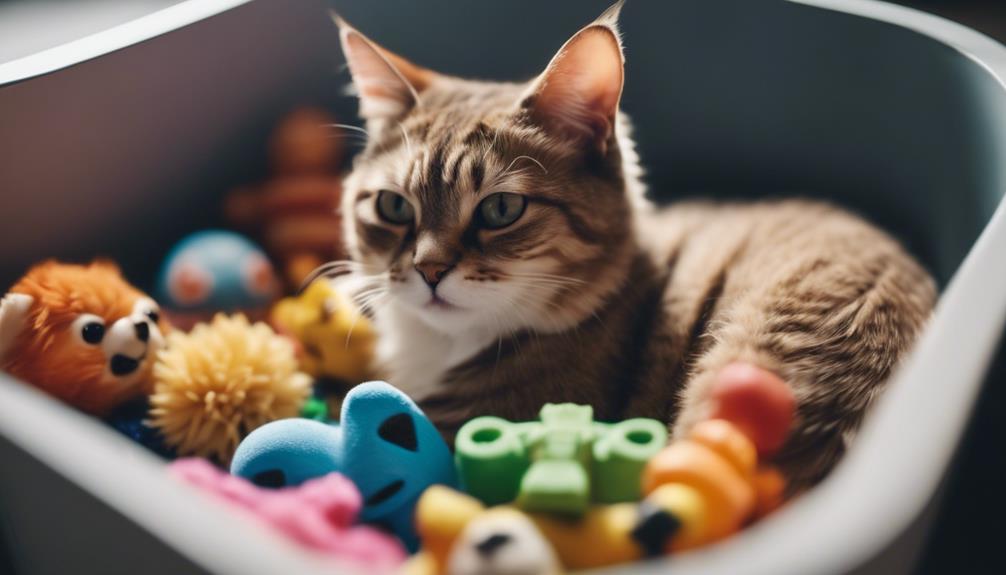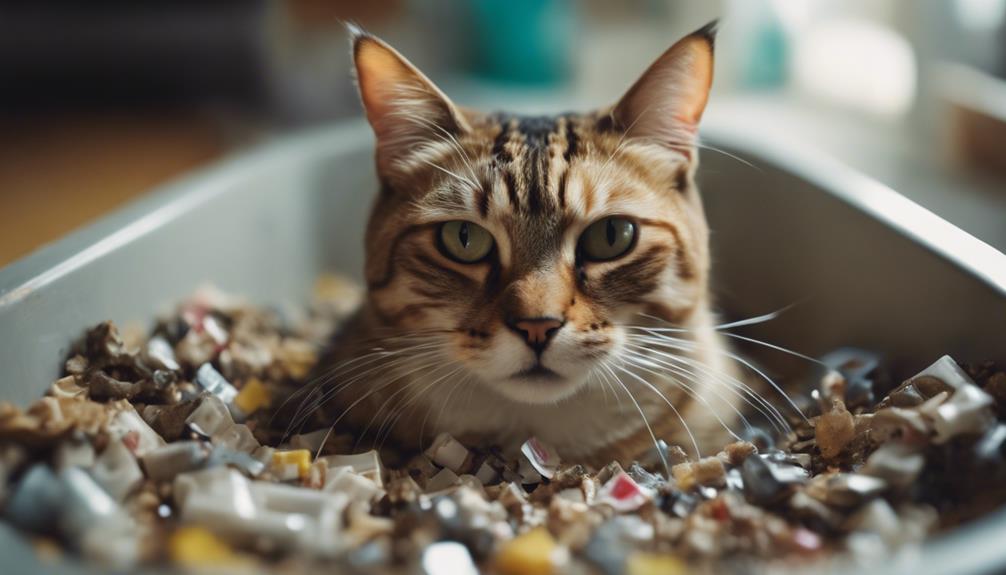Within the enigmatic world of feline behavior, cats can sometimes exhibit puzzling habits that leave their human companions perplexed. The sight of a cat choosing to slumber in its litter box may raise eyebrows and prompt questions.
Understanding the reasons behind this peculiar behavior could shed light on potential underlying issues that might impact a cat's well-being. So, why would a cat opt for the litter box as a sleeping spot? The answer lies in a combination of medical and behavioral factors that a cat behaviorist can help unravel.
Key Takeaways
- Cats may sleep in litter boxes due to comfort and safety.
- Health risks include infections and digestive issues.
- Address medical or stress factors to prevent litter box sleeping.
- Ensure a suitable environment with hiding spots and vet visits.
Common Reasons for Litter Box Sleeping
Cats may choose to sleep in the litter box due to a sense of security and comfort it provides. The enclosed space offers a cozy and private retreat for cats seeking solace or protection. In the wild, cats naturally look for secluded areas to rest, and the litter box mimics this instinctual behavior.
Additionally, the familiar scent of their own territory in the litter box may further contribute to their feeling of safety. While this behavior may seem unusual to humans, it's essential to understand and respect the reasons behind it.
Creating alternative comfortable and secure resting spots for the cat, along with addressing any underlying medical or stress-related issues, can help discourage this behavior and ensure the cat's well-being.
Medical Causes of Litter Box Behavior
After exploring the common reasons for cats choosing to sleep in the litter box, it's crucial to consider the potential medical causes that could be underlying this behavior. Medical issues can sometimes lead cats to seek out the litter box as a resting spot.
Some medical causes to be mindful of include:
- Urinary tract infections
- Constipation
- Arthritis
These conditions can cause discomfort for the cat, making them seek solace in the litter box. If your cat displays this behavior, it's essential to consult with a veterinarian to rule out any underlying medical concerns that may be contributing to their unusual choice of sleeping location.
Behavioral Triggers for Litter Box Rest

Identifying potential stressors in the environment can help pinpoint the behavioral triggers that lead a cat to seek rest in the litter box. Cats may retreat to the litter box due to changes like moving homes, new family members, or loud noises.
Disruptions to their routines can also cause stress, prompting them to seek comfort in familiar surroundings. Cats are known for their sensitivity to environmental changes, and even seemingly minor alterations can trigger anxiety in some felines.
Providing a calm and secure environment, enriched with hiding spots and elevated areas, can help alleviate stress-induced behaviors like sleeping in the litter box. Understanding and addressing these behavioral triggers is crucial in promoting your cat's well-being and ensuring they feel safe and secure in their home.
Health Risks of Litter Box Napping
Upon seeking refuge in the litter box due to behavioral triggers like stress and environmental changes, cats inadvertently expose themselves to various health risks associated with napping in this unsanitary location. Napping in the litter box can lead to bacterial infections in eyes, ears, and bladder, skin infections, and digestive blockages from ingesting litter particles, and an increased risk of illness due to sleeping where they eliminate.
These health risks highlight the importance of discouraging cats from using the litter box as a resting spot and addressing any underlying issues that may be prompting this behavior. Providing cats with comfortable and safe hiding spots outside of the litter box is crucial to ensuring their well-being.
Environmental Solutions for Litter Box Snoozing

To discourage cats from snoozing in the litter box, provide alternative cozy and safe hiding spots within their environment. Cats often seek out secluded and secure areas to rest, so offering options like cat trees, cozy beds, or soft blankets in quiet corners can divert their attention away from the litter box.
Elevated spots such as shelves or perches can also appeal to their natural instinct to perch up high. Additionally, consider providing interactive toys or puzzle feeders to keep them mentally stimulated and engaged.
Vet Visit Importance for Cat Behavior
Visiting the vet is crucial to address and understand potential underlying reasons for concerning cat behaviors. When it comes to a cat sleeping in the litter box, a vet visit becomes even more important. Here are some key points to consider:
- Medical Evaluation: A vet can perform a thorough medical examination to rule out any underlying health issues causing this behavior.
- Behavioral Assessment: Vets can also provide insights into the cat's behavior, helping to determine if stress or anxiety could be contributing to the litter box sleeping.
- Treatment Plan: Based on the vet's evaluation, a tailored treatment plan can be developed to address any medical or behavioral issues identified.
Creating Comfortable Cat Spaces

When addressing a cat's behavior of sleeping in the litter box, ensuring the creation of comfortable cat spaces is essential for promoting healthier habits. Cats require cozy and safe areas where they can relax without feeling the need to resort to unusual places like the litter box.
Providing hiding spots, elevated areas, soft bedding, and interactive toys can help cats feel secure and content. Cats often seek warm, quiet, and secluded spots, so incorporating these elements into their environment can discourage them from choosing the litter box as a sleeping area.
Seeking Behaviorist Guidance for Cats
Seeking guidance from a behaviorist can provide valuable insights into understanding and addressing problematic behaviors in cats. Behaviorists are trained professionals who can offer specialized help for cat owners dealing with challenging situations.
Here are some benefits of consulting a behaviorist:
- Specialized Knowledge: Behaviorists have a deep understanding of feline behavior and psychology.
- Tailored Solutions: They can create customized behavior modification plans to suit your cat's specific needs.
- Support System: Behaviorists offer ongoing support and guidance to help you implement strategies effectively.
Understanding Cat Stress Factors

Behaviorists play a crucial role in helping cat owners identify and address the various stress factors that can impact their feline companions. Cats are sensitive animals, and several factors can lead to stress in their lives. Changes in the environment such as moving to a new house, loud noises, or the introduction of new family members can trigger stress in cats.
Disruptions to their routine, like changes in feeding schedules or litter box placement, can also cause anxiety. Cats are creatures of habit, and any deviation from their established patterns can be distressing. Understanding these stress factors is essential for creating a harmonious environment for your cat and preventing behaviors like sleeping in the litter box.
Additional Resources on Cat Behavior
For cat owners looking to delve deeper into understanding their feline companions' behavior, a wealth of additional resources on cat behavior is available to explore. Here are some valuable resources to help you learn more:
- Books: 'Think Like a Cat' by Pam Johnson-Bennett offers insights into cat behavior and ways to improve your bond with your pet.
- Online Courses: Platforms like Coursera and Udemy offer courses on cat behavior and communication, allowing you to learn at your own pace.
- Cat Behaviorists: Consulting with a certified cat behaviorist can provide personalized advice and solutions for your cat's specific behavioral issues.
Conclusion
In conclusion, understanding why cats sleep in litter boxes can be as puzzling as deciphering a cryptic message. By exploring both medical and behavioral factors, cat guardians can unravel this mystery and ensure their feline friends' well-being.
Just like a detective cracking a case, identifying the root cause and implementing environmental solutions can create a comfortable and stress-free space for cats to rest and thrive.




